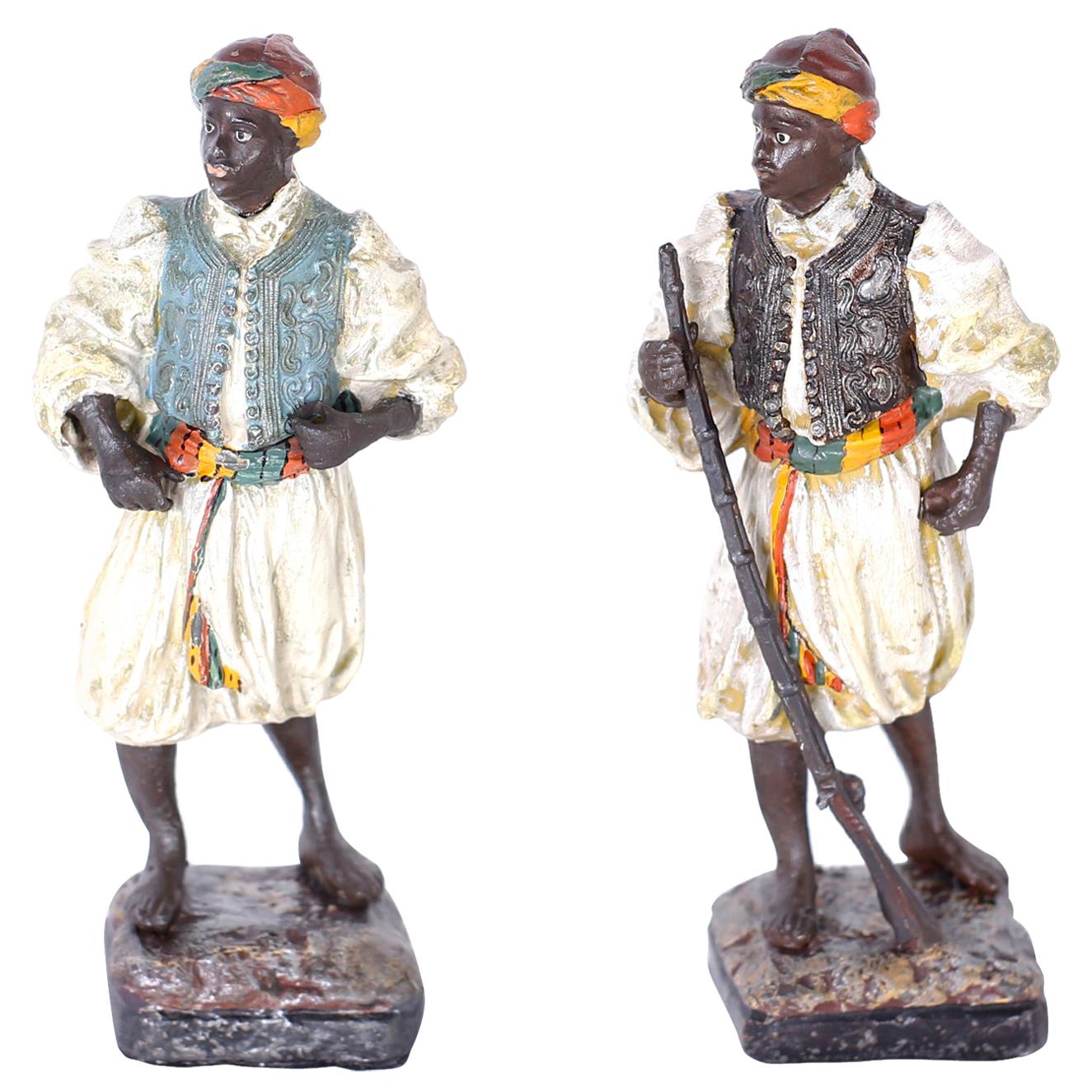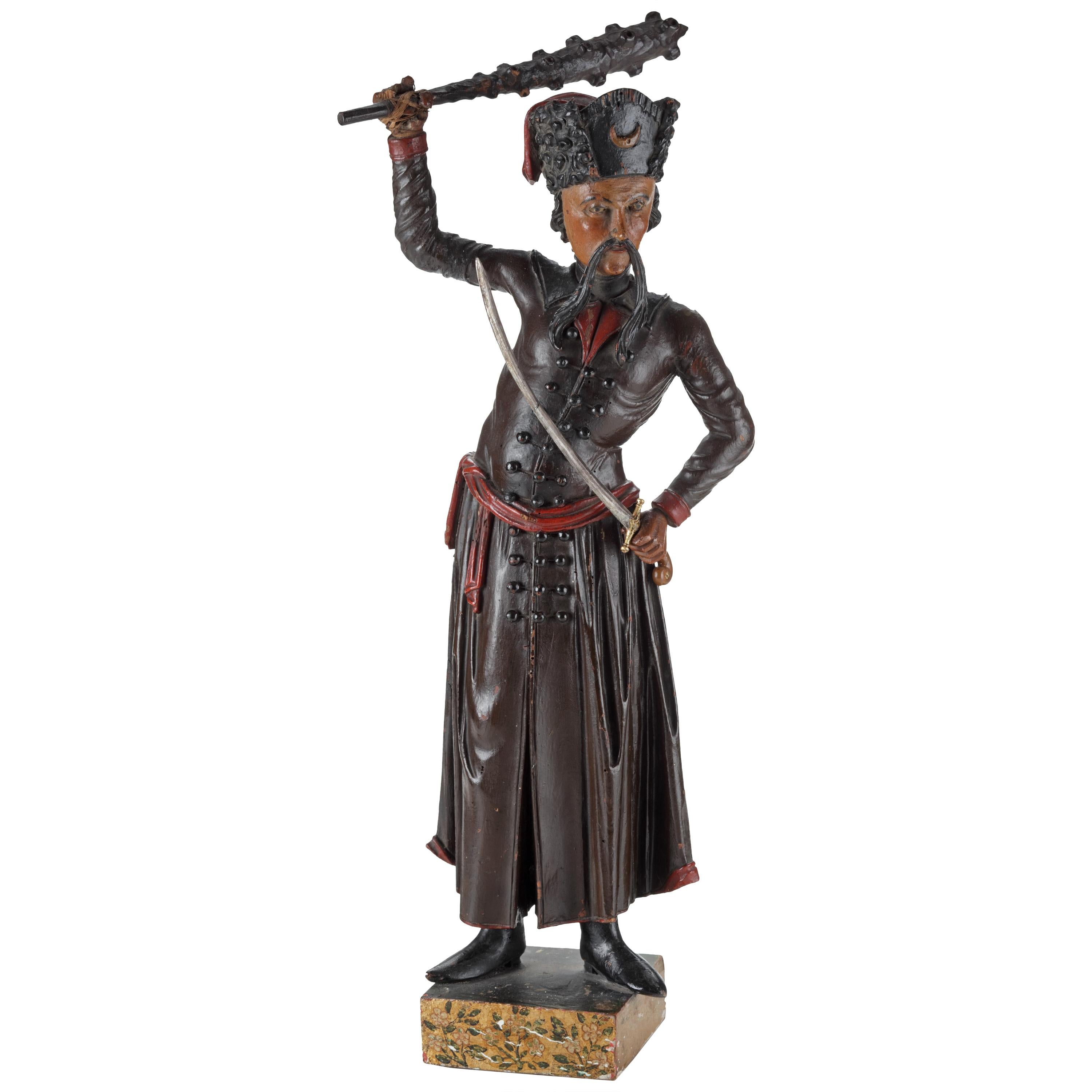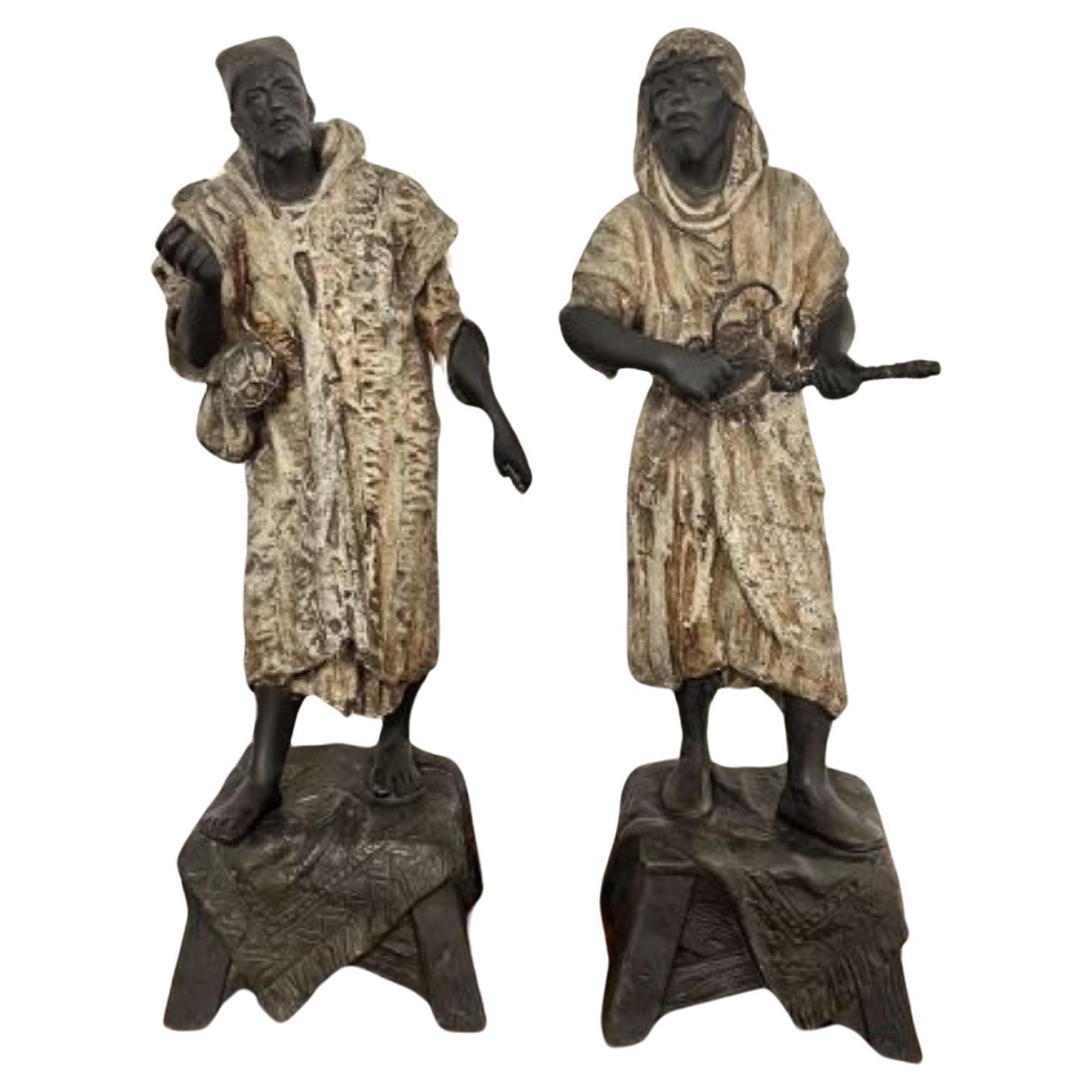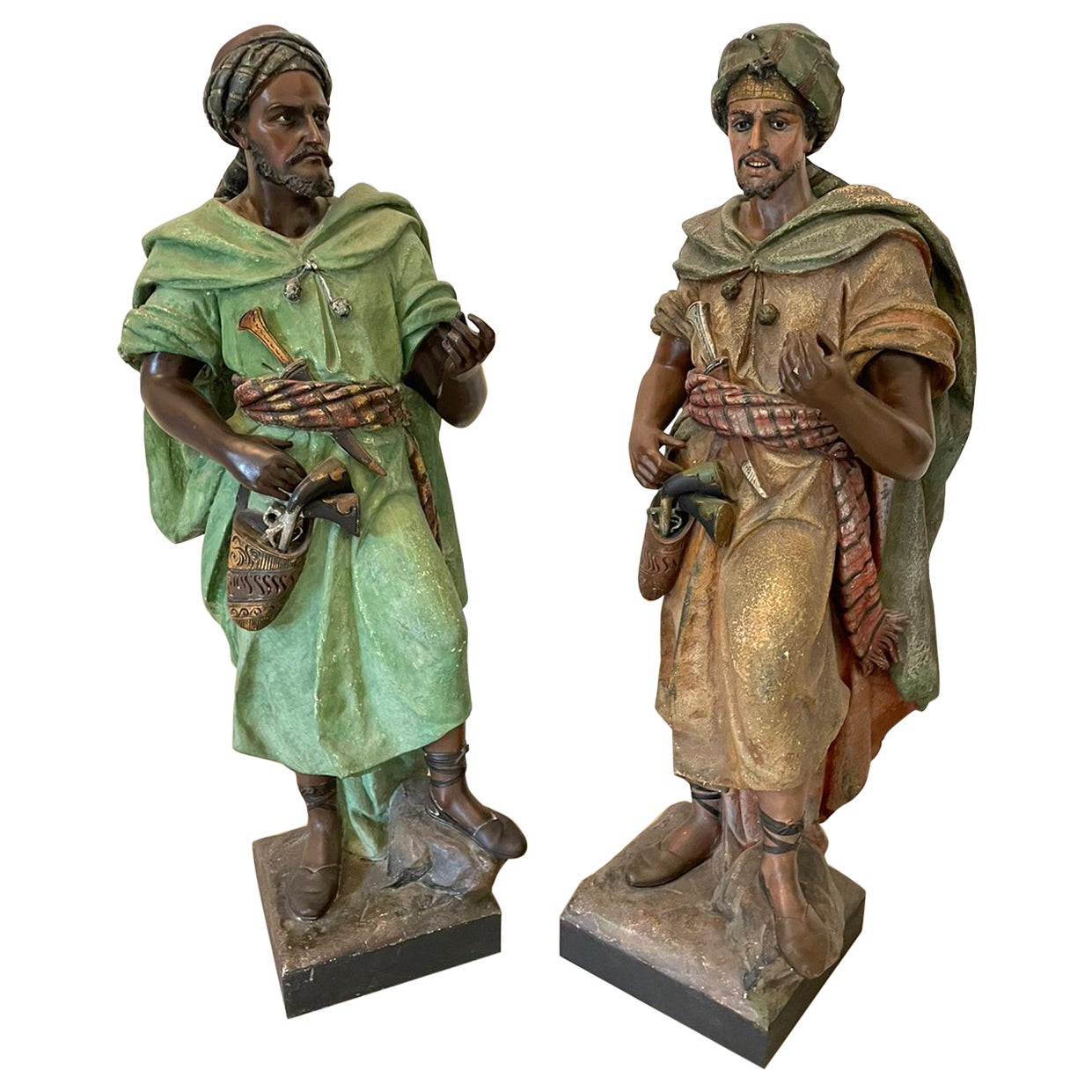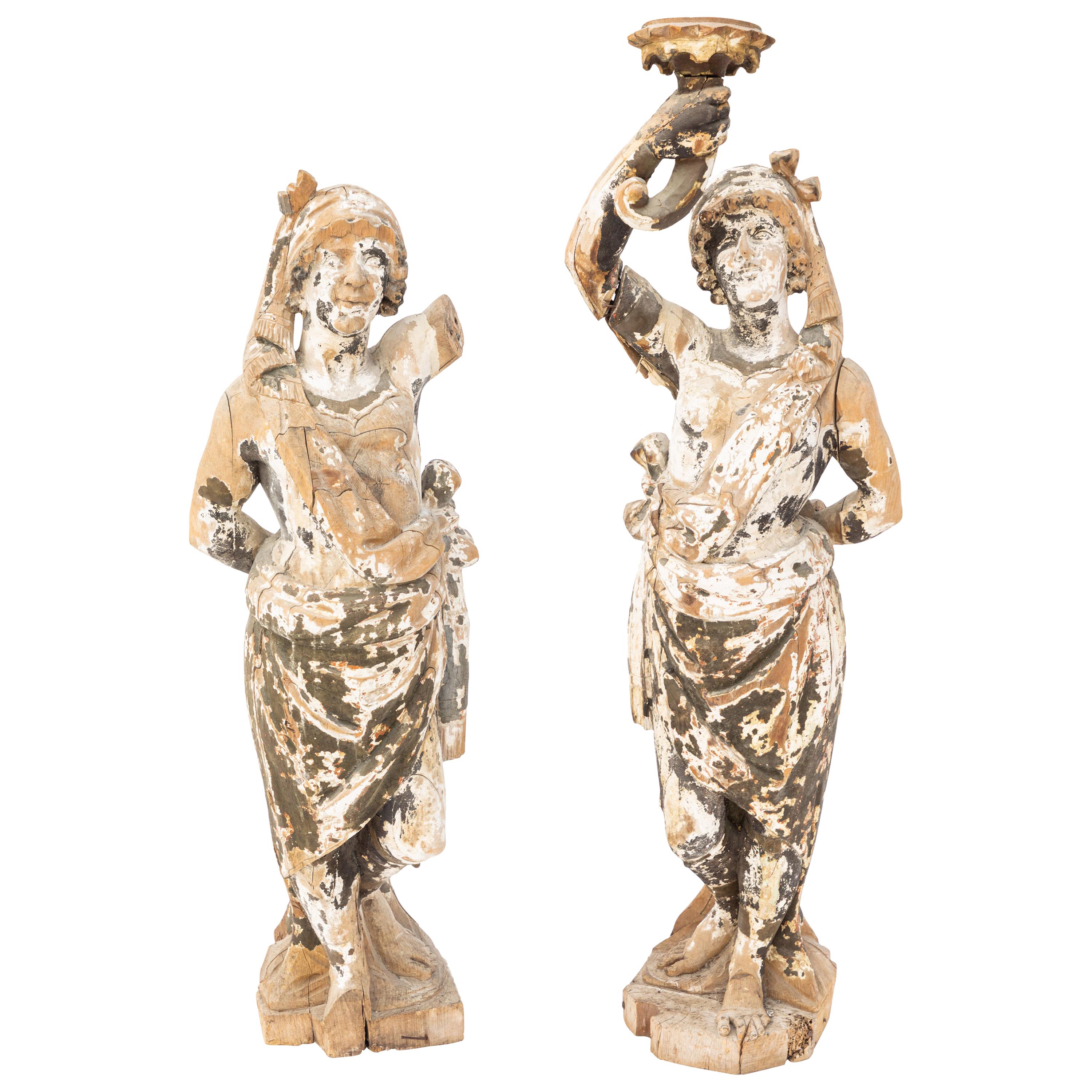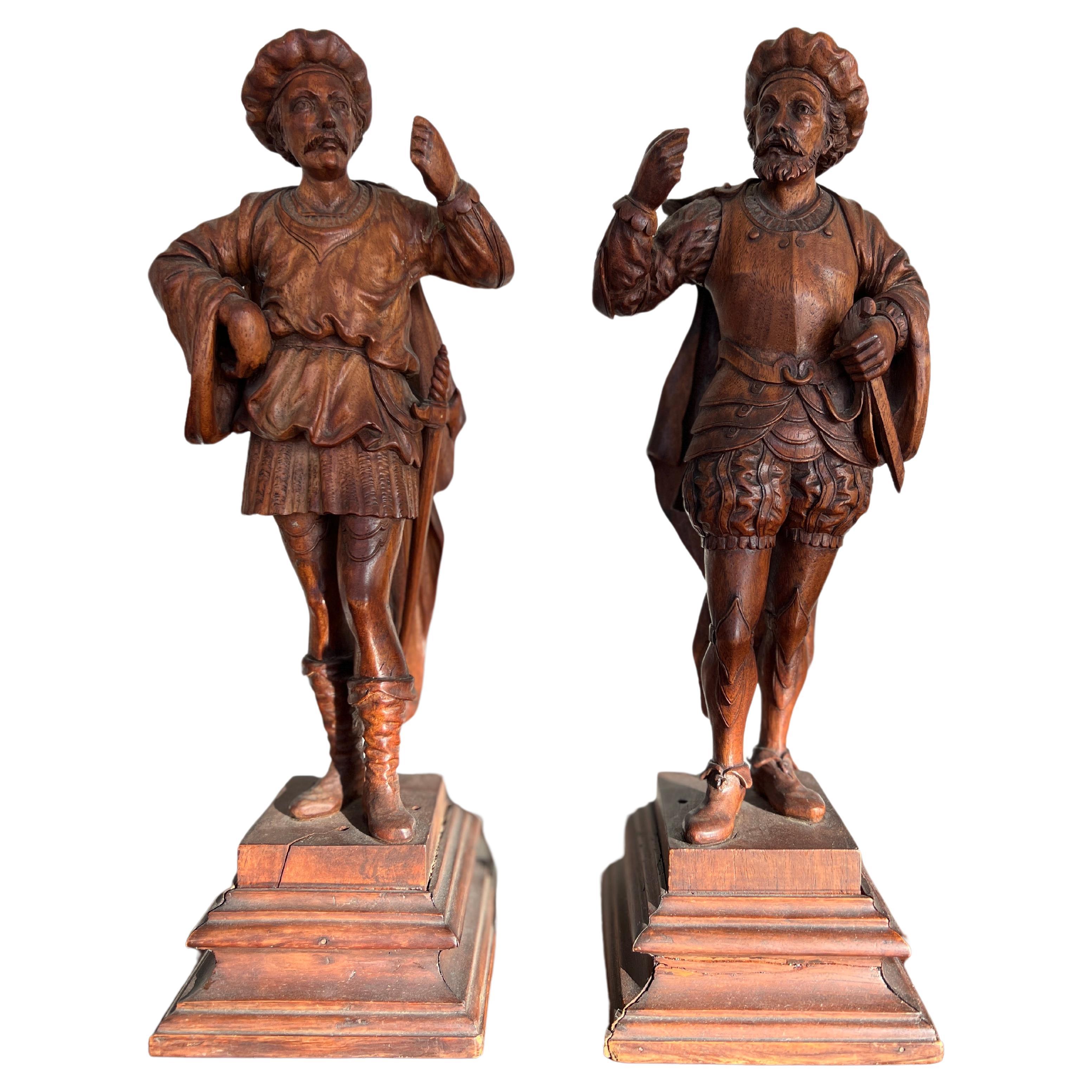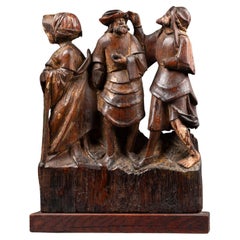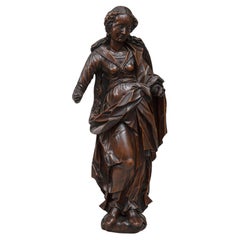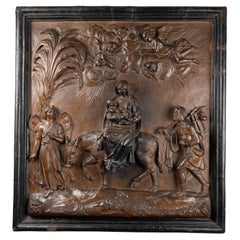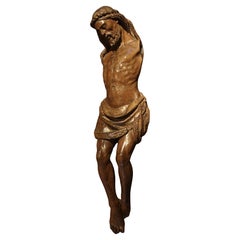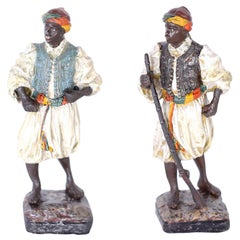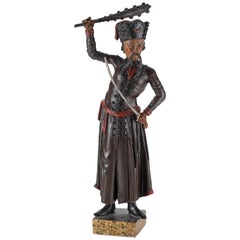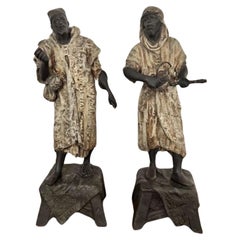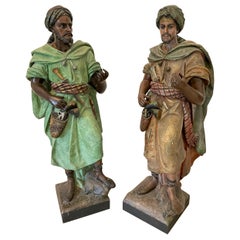Items Similar to Two rare Figures in Turkish Attire - Venice, early 17th century
Want more images or videos?
Request additional images or videos from the seller
1 of 9
Two rare Figures in Turkish Attire - Venice, early 17th century
$26,275.92per set
£19,537.85per set
€22,000per set
CA$36,905.79per set
A$40,630.53per set
CHF 20,766.36per set
MX$484,936.32per set
NOK 264,399.98per set
SEK 247,419.44per set
DKK 167,613.73per set
About the Item
Rare Bronzes Depicting two Figures in Turkish Attire
Possibly Suleiman the Magnificent at two different ages
bronzes, alabaster bases
Venice, early 17th century
19,5 x 6 x 5 cm
These two rare bronze statuettes represent two figures dressed in elaborate "Turkish" attire. They are mounted on alabaster bases with bronze reliefs—one featuring the winged lion of Venice, and the other possibly symbolizing Turkey with a wolf depiction.
One figure wears a grand külah, a spherical turban with a cone top, signifying royal authority, while the other has a wrapped turban, denoting rank and religious identity. Their garments are richly detailed with intricate engravings, suggesting luxurious fabrics of the Ottoman court.
The statuettes may represent Suleiman the Magnificent at two different stages of life, as both young and old. The sultan depicted alongside the winged lion corresponds to a description from a Venetian delegate in 1534, when Suleiman was 43. At that time, he had conquered Iraq from the Safavids and achieved a decisive victory over the Papal fleet at the Battle of Preveza. He was described as having large eyes, an aquiline nose, and long red mustaches—traits visible in Cristofano dell'Altissimo’s portrait of Suleiman in the Uffizi Gallery in Florence.
Unlike Mehmed II, who commissioned portraits by European artists for diplomatic purposes, Suleiman did not directly order such representations. Instead, his likeness spread through works by artists like Albrecht Dürer, based on sketches made by diplomats. Following his capture of Belgrade in 1521, his victory over Hungary in 1526, and his siege of Vienna in 1529, Suleiman gained international fame. He was both admired and feared by rulers across Europe and recognized as one of the most illustrious figures of his era.
The winged lion and Turkish wolf accompanying the bronzes suggest a political and diplomatic significance, reflecting the complex relationship between Venice and the Ottoman Empire. Despite ongoing territorial disputes and wars, both powers sought peaceful coexistence, driven by the need to sustain trade. Venice and the Ottomans signed multiple treaties during the reigns of Mehmed II and Suleiman. After the Battle of Lepanto in 1571, where the Holy League (including Venice) defeated the Ottoman fleet, relations were strained but soon restored. Venice, prioritizing its economic interests, signed a peace treaty with the Ottomans in 1573, allowing the Serenissima to maintain vital trade routes and Mediterranean stability.
The presence of the winged lion alongside a sultan emphasizes Venice’s intent to foster positive relations with the Ottoman Empire. These bronzes may have been created after one of the many peace treaties between the two powers. Bronzes, sculptures, clocks, and medals were typical diplomatic gifts from Venetian representatives, and these statuettes, symbolizing the close ties between the Serenissima and the Ottoman Empire, were likely presented to an Ottoman ambassador during one of the peace agreements of the 16th century.
European perceptions of the Ottomans were complex. While the empire posed a significant threat, as during the siege of Vienna, trade and diplomacy continued to prevail, fostering a lasting cultural exchange between East and West well into the 17th century.
Bibliography:
Bellingeri, Giampiero. "Turchi e Persiani fra visioni abnormi e normalizzazioni, a Venezia (secoli XV-XVIII)." In RILUNE — Revue des Littératures Européennes, no. 9, “Visions de l’Orient,” edited by Benedetta De Bonis and Fernando Funari, 2015, pp. 14-89
Bevilacqua, Alexander. The Republic of Arabic Letters: Islam and the European Enlightenment. Harvard University Press, 2020.
Born, Robert, Michal Dziewulski, and Guido Messling. L'Empire du Sultan: Le Monde Ottoman dans l'Art de la Renaissance. Lannoo - Bozar Books.
Etrangers et Vénitiens dans l’art du XVIIe siècle. Milan: Silvana Editoriale, 2018.
Pessa, L. "Figure di Turchi nell’arte genovese tra XVI e XVII secolo." In Turcherie, cited in note 98, pp. 40-42.
Renard, Alexis. Turkophilia Révélée: L'Art Ottoman dans les Collections Privées. 14th International Congress of Turkish Art, 2011.
Weihrauch, H.R. Europäische Bronzestatuetten. Brunswick, 1967.
- Dimensions:Height: 7.68 in (19.5 cm)Width: 2.37 in (6 cm)Depth: 1.97 in (5 cm)
- Sold As:Set of 2
- Style:Renaissance (Of the Period)
- Materials and Techniques:
- Place of Origin:
- Period:
- Date of Manufacture:17th century
- Condition:Wear consistent with age and use.
- Seller Location:Bruxelles, BE
- Reference Number:1stDibs: LU6666242615412
About the Seller
5.0
Vetted Professional Seller
Every seller passes strict standards for authenticity and reliability
1stDibs seller since 2022
15 sales on 1stDibs
Typical response time: <1 hour
- ShippingRetrieving quote...Shipping from: Bruxelles, Belgium
- Return Policy
Authenticity Guarantee
In the unlikely event there’s an issue with an item’s authenticity, contact us within 1 year for a full refund. DetailsMoney-Back Guarantee
If your item is not as described, is damaged in transit, or does not arrive, contact us within 7 days for a full refund. Details24-Hour Cancellation
You have a 24-hour grace period in which to reconsider your purchase, with no questions asked.Vetted Professional Sellers
Our world-class sellers must adhere to strict standards for service and quality, maintaining the integrity of our listings.Price-Match Guarantee
If you find that a seller listed the same item for a lower price elsewhere, we’ll match it.Trusted Global Delivery
Our best-in-class carrier network provides specialized shipping options worldwide, including custom delivery.More From This Seller
View AllGroup of Altarpiece - Antwerpen, 16th century
Located in Bruxelles, BE
Group of altarpiece representing the life of a Saint, Saint Renualde?
Engraved by the sign of Antwerp hand on the hat of the central character
Carved oak, traces of polychromy
Fir...
Category
Antique 16th Century Belgian Renaissance Figurative Sculptures
Materials
Oak
$11,465 Sale Price
40% Off
Statuette of the Virgin, South German circa 1600
Located in Bruxelles, BE
Statuette of the Virgin
South-German, circa 1600
sculpted wood
circa 1600
(right arm restored)
52 cm
Category
Antique 17th Century German Renaissance Religious Items
Materials
Wood
Large Terracotta Relief - Lombardy, First Half of 17th Century
Located in Bruxelles, BE
Large Terracotta relief of the flight into Egypt
Lombardy, first half of 17th century
Painted terracotta
91 x 85 x 11,5 cm
This event in the early life of Christ is recounted i...
Category
Antique 17th Century Italian Baroque Figurative Sculptures
Materials
Terracotta
$62,106 Sale Price
20% Off
Christ - Umbria, second half of the 15th century
Located in Bruxelles, BE
Christ
Umbria, Orvieto?
Second half of the 15th century
77 x 16.5 cm
Category
Antique 15th Century and Earlier Italian Renaissance Figurative Sculptures
Materials
Walnut
$7,614 Sale Price
25% Off
Followers of Jean de la Huerta, Jean de Blany ? - Saint Jerome
Located in Bruxelles, BE
Followers of Jean de la Huerta, Jean de Blany ?
Saint Jerome
Limestone
Burgundy, second half of the15th century
60,5 cm
ALR Ref : S00248050
This exquisite sculpture of Saint Jerome, carved from soft, nearly white limestone typical of eastern France, exemplifies the exceptional craftsmanship of 15th-century Burgundian art. The figure of Saint Jerome, a key figure in Christian history renowned for translating the Bible into Latin, is depicted wearing a cardinal’s hat and holding the Vulgate Bible...
Category
Antique 15th Century and Earlier French Renaissance Figurative Sculptures
Materials
Limestone
Circle of Pierpaolo and Jacobello Dalle Masegne (Venice, late 14th century)
Located in Bruxelles, BE
Circle of Pierpaolo and Jacobello Dalle Masegne (Venice, late 14th century)
San Bartolomeo
high relief 'en applique'
white marble
52 x 30 x 14 cm
Provenance :
Collection South of...
Category
Antique 15th Century and Earlier Italian Gothic Figurative Sculptures
Materials
Marble
You May Also Like
Pair of Cold Painted Orientalist Figures
Located in Palm Beach, FL
Pair of antique French Moroccan figures cold painted over spelter with striking detail, colorfully dressed and ready for action with one holding a rifle.
Category
Antique Late 19th Century French Moorish Figurative Sculptures
Materials
Spelter
$1,250 / set
Orientalist Turkomania Wood Sculpture of an Ottoman, Early 19th Century
Located in Amsterdam, NL
A carved and painted wood 'TURKOMANIA' sculpture of an ottoman soldier
French or Dutch Turkomania, early 19th century
Depicted in standing position, with a sword in one hand and a club in the raised other, with a fur hat, long moustache and long coat, on a square base.
Measures: H. 58 cm
Note:
During the Dutch War of Independence from 1568 till 1648, the Dutch and Turks were allies against Roman Catholic Spain and the slogan of the Dutch was “liever Turks dan Paaps” (rather Muslim than Roman Catholic).
In 1612 the first Dutch ambassador arrived in Istanbul. Nevertheless, in Holland, there was also the image of the cruel and heretic Turk stemming from the frequent violent clashes between Dutch ships and the pirates from Algiers, usually called the “Turkish pirates”. When the Ottoman armies advanced against Vienna, in the eyes of many Europeans the Islam bent on destroying Christianity. Later in the early 19th century, although the Turkish threat to Europe was long gone, the image of the Turks deteriorated again because of the Greek uprising.
The Sultan Mahmud II understood that Turkey had to modernize along West European lines and among other things in 1808 he replaced the “picturesque” oriental clothing...
Category
Antique Early 19th Century Dutch Figurative Sculptures
Materials
Wood
Unusual pair of antique Victorian spelter figures
Located in Ipswich, GB
Unusual pair of antique Victorian spelter figures depicting two males in traditional moorish robes and headdresses standing on ornate square ...
Category
Antique 19th Century Victorian Figurative Sculptures
Materials
Spelter
Spectacular Pair of Large Antique Quality Polychromed Plaster Moorish Figures
Located in Suffolk, GB
Spectacular pair of large antique quality orientalist polychromed plaster Arabesque or Moorish figures
depicting two males in traditional moorish robes and headdress with artfully s...
Category
Early 20th Century English Figurative Sculptures
Materials
Other
Pair of 18th Century Italian Carved Wood Figures
Located in Los Angeles, CA
Pair of 18th century Italian carved wood figures. Originally polychromed and now aged to a shabby chic look.
Category
Antique 18th Century Italian Figurative Sculptures
Materials
Wood
$3,850 / set
Pair, 19th Century Italian Renaissance Figural Spanish Soldiers or Landsknecht
Located in Atlanta, GA
Likely Italian, but possibly German origin - 19th century
A pair of finely carved wood figures of Spanish Conquistadors or German Landsknecht. Each modeled in the Renaissance attire...
Category
Antique 19th Century Italian Baroque Figurative Sculptures
Materials
Walnut
$1,588 Sale Price / set
20% Off
More Ways To Browse
Siege Antique
Antique Trade Signs
Ottoman Antique Art
Rare Alabaster
Ottoman Sultan
Suleiman The Magnificent
Turkish Lion
Bronze Winged Lion
Lion Of Venice
Battle Of Lepanto
Patrick Laroche
Plaster Egyptian
Porcelain Dancer Figurine
Porcelain Figurines Royal Doulton
Reclining Bronze Nude
Sandstone Head Sculpture
Sculpture Minerva
Spelter Figures
